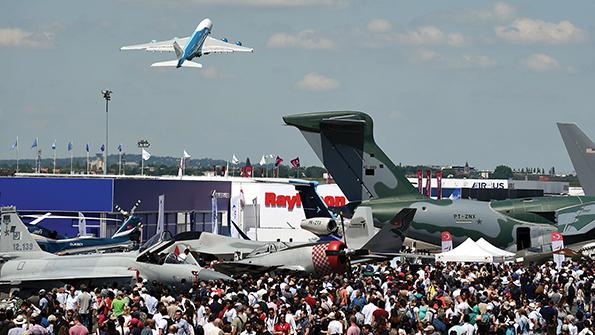
To paraphrase an advertising industry saying, half of all air show spending is wasted, but nobody knows which half.
I am a fan of air shows, but I understand why to some they seem like lavish relics of a pre-Zoom/pre-COVID-19 age. The Le Bourget site and other air shows might have an image problem: The public associates them with flashy announcements of jetliner orders that were negotiated beforehand and followed by expensive, well-catered receptions. But the perception that this comprises the bulk of air show business is incorrect.
In reality, most business is conducted in the enormous halls and smaller chalets, where system suppliers promote their displays, power units and controls for future applications. Or where smaller suppliers promote their gaskets, fasteners and coolants for those systems. Or where the world’s states, prefectures and provinces promote themselves as ideal sites for building all this equipment. Or where all the people who maintain these aircraft and systems promote their services.
In short, air shows are primarily about the enormous and intricate industry that creates ever-improving platforms and systems. Smart people in my line of work focus heavily on the supply chain for a good reason. The white-hot competition behind constantly improving avionics, materials, engines and systems produces most of the technological innovation and value added in aviation manufacturing. Airbus’ and Boeing’s jetliner revenues are just a fraction of the supplier and aftermarket companies’ total output.
All that supplier innovation helps transform old platforms. A 2021 Airbus A320neo looks a lot like a 1987 A320, but it burns much less fuel, is much easier to maintain and pollutes less, too. The equipment that made those improvements possible was discussed, marketed and rolled out at air shows. The industrial partnerships and investments behind this equipment might have been lined up at air shows, too.
The supply chain also is where company fortunes (and ownership) change most quickly. Air shows provide opportunities for executives and investors to discuss mergers, divestitures and other changes. These discussions also are far removed from news the public sees about Airline X ordering another 20 jetliners.
Perhaps we do know which air show spending might be wasted: those jetliner sales announcements. And they are probably not anything like half of the business actually conducted at air shows. But since these announcements serve a greater common good—celebrating aviation as a mainstay of the world economy and as a fun activity—they are not really wasted, either. Even from a noncommunal-good standpoint, these events build brand equity, if only in nonquantifiable ways.
The debate over air shows mirrors the broader debate over the future of business travel. Some believe business travel will not regain its previous levels or at least its previous growth rates. This view posits that new video technologies, along with the stay-at-home habits and slashed budgets brought on by the pandemic, will stay in place, perhaps forever.
But we need to distinguish between intra-company travel and customer-facing travel. The former might decline as a result of the pandemic and new technologies coming into greater use. But customer-facing travel—the strong majority of all business travel—is different, and air shows are basically 100% customer-facing travel.
The truth is that competition continues unabated among primes, suppliers and people. When there are no air shows and there is little or no business travel, it is easy to say that your company, or you, will not travel as much anymore. But when shows resume and travel starts up again, if your company tries to sell, market or network via remote video conferences, and your competitor shows up in person, your rival will have a strong advantage.
For customer-facing business travel, the future is simple. Many businesses will explain their plan to cut costs (and enhance profits) by cutting back on travel expenses, including air shows. They then will find themselves losing market share. And individuals—executives, salespeople, consultants—who do not show up in front of customers or at air shows will lose relevance. As noted philosopher and former professional boxer Mike Tyson once said: Everyone has a plan until they get punched in the mouth.
The views expressed are not necessarily those of Aviation Week.






Comments